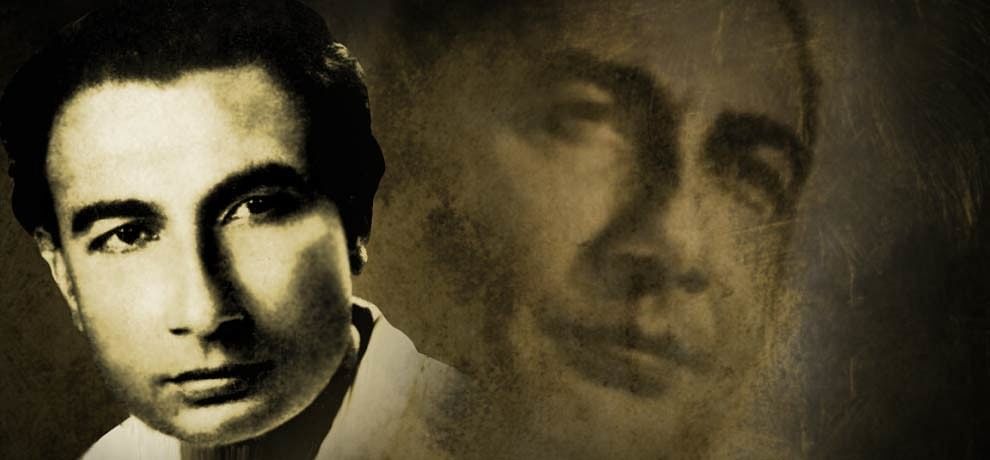
It is a delicious coincidence that International Women's day coincides with Sahir Ludhianvi's birthday (March 8, 1921). Here was a firebrand poet who spoke of the plight of the ordinary people and gave us the most defining verses about women and their emotions.
This was perhaps because a single woman had brought him up. Sahir's mother had left his father Fazal Mohammad who had remarried, taking with her their son, 13-year-old Abdul Hai (Sahir Ludhianvi was his pen name). The father fought a legal battle for his custody but the mother's stance prevailed and the Lahore High Court ruled in her favour.
Sahir's father was a rich landowner, and his mother had to struggle to make ends meet. Perhaps this is what inspired a song in the film Trishul (1978), where the single mother played by Waheeda Rehman battles many a hardship to bring her son up. It gives voice to the struggles of single, working mothers trying to raise their children with hard work and dignity, seeking to equip them to face a harsh world.
This lullaby from the dacoit saga Mujhe Jeene Do (1963) is a complete commentary on a woman's maternal instincts and yet again a reflection on his relationship with his mother.
Whether it was the result of the close relationship he shared with his mother or his initial affair with a classmate ending in tragedy that led to his great empathy for women, or his Marxist leanings, he was the first poet to explore the marginalisation of women, of those forced to enter the flesh trade, and comment on the hypocrisy of those who eulogised the culture of the East yet didn't think twice about using women. Whatever the reason he penned the most iconic verses, which were later adapted into film songs. His disillusionment with the world still rings true and was used in the film Pyaasa (1957).
This world where society itself is an enemy of humansThis world where greed dictates the customsSo what if I attain this world and make it my own?
These lines from the same song describe the commodification of women:
He visited many brothels in Lahore to understand the oppression endured by the women working there; this took shape as the nazm "Chakle" that he later adapted for the film Pyaasa. I still get goose pimples when I hear these words or watch the picturisation. The original nazm, written before Independence, questioned the custodians of eastern piety:
I am using the popular film lyrics, which were written in independent India, where he added the hook line "Jinhe naaz hai Hind par vo kahan hain"?
He blamed patriarchy and feudalism for the exploitation of women and gave us their most definitive description in Sadhna (1958) where he blames the men for turning women into commodities. This too was his old nazm that he modified for the film. No one had said this with so much clarity before this as it was the women who were disgraced for being in the flesh trade:
Every word of the poem is trailblazing feminist commentary in questioning the double standards of men, in highlighting their role in the exploitation of women.
A woman's desire to be accepted by her lover on her own terms found voice in this song:
Devdas (1953)
Sahir Ludhianvi's last work as a lyricist was for the BR Chopra film Insaaf ka Tarazu (1980), about a rape survivor's fight for justice. Here, he reiterates that a woman is not a mere body but a person in her own right.
Sahir's pen didn't just write about ordinary women but those who were lost in royal harems too. In his nazm "Nur Jahan ke mazaar par", he questions how royalty and feudal lords used and discarded women:
To soothe the urges of arrogant kingsYear after year, beauties were put on sale
The 1963 film Chitralekha has some of my favourite lyrics. The song
captures the essence of men who adopt celibacy and live a hermit's life, while giving the role of the evil influence to women.
The 1959 film Didi talks of the emotions of a woman in love, who does not expect reciprocal feelings of a man who perhaps doesn't have the same capacity to love, selflessly:
While there is rebellion, social commentary and the typical male attitude of considering women inferior in his earlier poems, playwright Danish Iqbal says that Sahir used the clichd nurturing attitude of women in this song and that is why, perhaps, the song from the 1964 film Shagoon is very popular with men.
When India became independent there was a rebellion against the age-old traditions, as reflected in his early poetry.
It's true his poems spoke of women's traditional roles, perhaps under market pressure. He was now penning new lyrics, not using his old nazms. The dilemma of women in love has been captured in Aankhen(1968).
I don't think anyone except Sahir Ludhianvi could capture the depth of love and the longing of a woman as this song from the film Pyaasa has.
Sahir was indeed a man ahead of his time, a man who deservedly shares his day with women.
Topic started by Angel-likeDevil
Last replied by Angel-likeDevil

